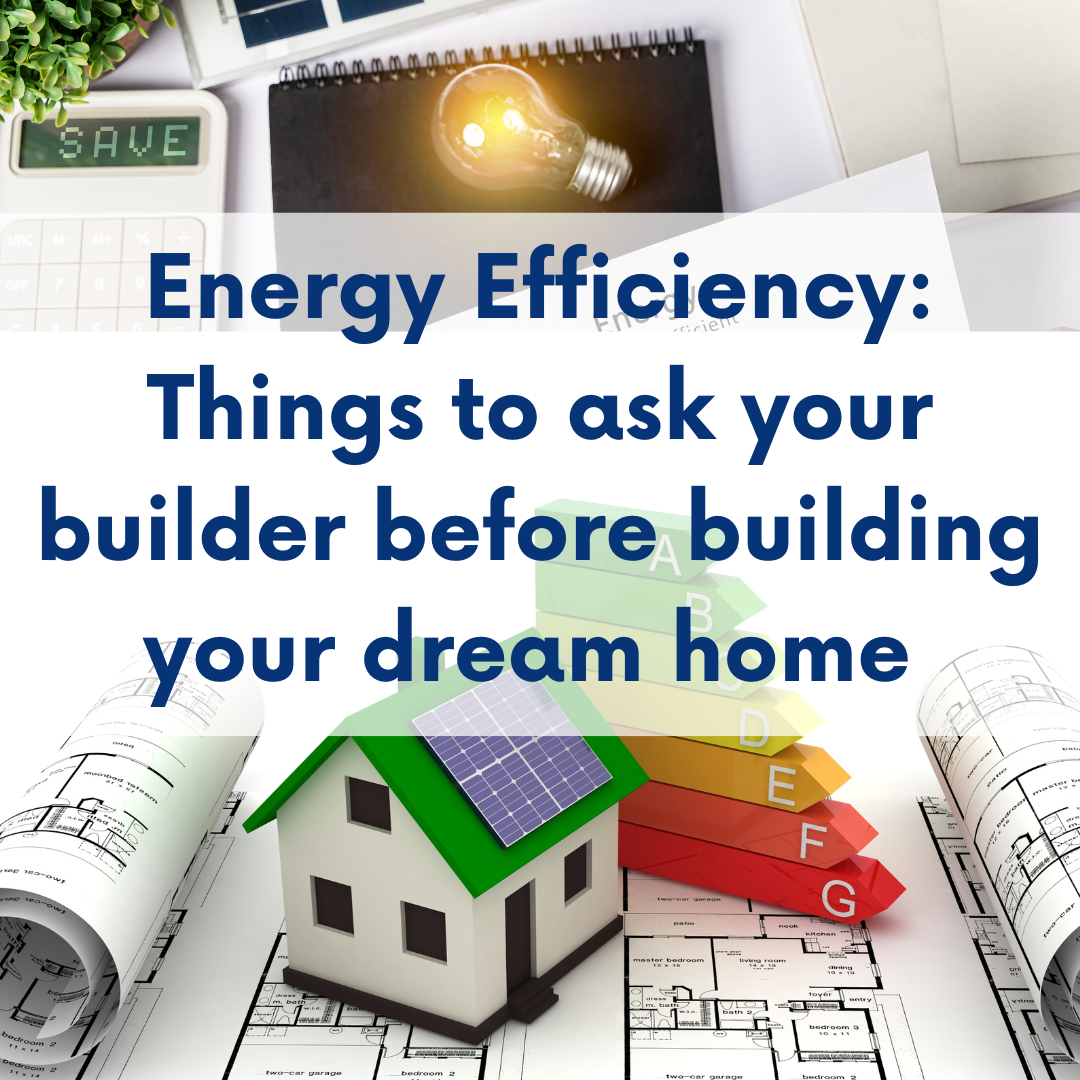Energy Efficiency: Things to ask your builder before building your dream home.
Energy efficiency starts with a good construction plan.
In today’s world, energy efficiency has become a critical concern for homeowners, not just for reducing utility bills but also for minimizing environmental impact and enhancing comfort. What better time to consider these things than when building a new home? This article will delve into what energy efficiency means in a residential home building context, how to achieve it, and the benefits it offers. This is a list of things to ask your builder before building a new home.
What is Energy Efficiency?
Energy efficiency refers to using less energy to provide the same level of service or comfort. In a home, this encompasses various systems and practices that minimize unnecessary energy consumption without sacrificing performance. Achieving energy efficiency can involve upgrading appliances, improving insulation, using smart technology, and embracing renewable energy sources. The best way to go about energy efficiency however, is to have that conversation before starting on the project, whether its new construction home or a remodeling job.
The Importance of Energy Efficiency
Cost Savings: Energy-efficient homes incur lower energy bills. According to the U.S. Department of Energy, energy-efficient upgrades can save homeowners 10% to 50% on their energy bills.
Environmental Impact: Reducing energy consumption translates to fewer greenhouse gas emissions from energy production, contributing to a smaller carbon footprint.
Comfort and Health: An energy-efficient home maintains more consistent temperatures and indoor air quality, enhancing occupants' comfort and overall well-being.
Increased Property Value: Homes that are energy-efficient can have higher resale values and are often more attractive to potential buyers. When building a home, its good to think about the exit strategy, in case you have to move and want to sell your home.
Energy Independence: Utilizing less energy fosters a sense of energy independence, decreasing reliance on non-renewable energy sources. What some call, off grid living.
Key Areas to Improve Energy Efficiency
Insulation and Sealing: Proper insulation in walls, attics, and floors helps retain heat during the winter and keep cool air inside during summer. Air leaks around windows, doors, and ductwork can also lead to energy loss. Sealing these gaps with caulk or weather stripping prevents drafts and enhances comfort. Foam insulation is a popular option with many homeowners.
Energy-Efficient Appliances: Upgrading to ENERGY STAR-rated appliances can significantly reduce energy usage. Washers, dryers, refrigerators, and HVAC systems designed with energy efficiency in mind consume less electricity and water while delivering improved performance. If your builder is proving an appliance package with the build, make sure it is of top quality and has a good efficiency rating.
Windows and Doors: Installing double- or triple-glazed windows reduces heat transfer. Consider using energy-efficient window treatments to manage indoor temperatures. Similarly, energy-efficient doors can enhance insulation and reduce air leaks. There are so many options out there, make sure to specify manufacturer and rating when talking to a custom home builder or remodeler and getting an estimate.
Heating and Cooling Systems: Properly maintaining your heating, ventilation, and air conditioning (HVAC) systems, including regular filter replacements and tune-ups, can enhance their efficiency. Consider upgrading to a smart thermostat that optimizes heating and cooling schedules based on occupancy patterns.
Water Heaters: Tankless water heaters also offer a unique savings opportunity when used in appropriate situations. These systems provide efficient heating on demand, which can significantly reduce energy consumption and lower utility bills over time, making them an appealing option for many homeowners. Tankless water heaters are available in several different options, including natural gas, propane, and electric varieties. Each option offers unique benefits and features, discuss with your builder what options they offer and what would be the best fit for you.
Lighting: Switching to LED lighting can reduce energy consumption by up to 80% compared to traditional incandescent bulbs. Additionally, utilizing natural light through strategic window placement can further decrease reliance on artificial lighting. Something to bring up with a builder or an architect when designing the house plans.
Smart Home Technology: Smart devices can optimize energy usage by automating lighting, heating, and cooling. For example, smart thermostats adjust temperatures based on occupancy and preferences, leading to further energy savings.
Renewable Energy Sources: Incorporating solar panels or other renewable energy systems can drastically reduce reliance on conventional power sources. While the initial investment can be significant, government incentives and long-term savings on energy bills can make these options financially viable.
Enhancing energy efficiency in a home is a worthwhile investment that offers immediate and long-term benefits. By improving insulation, upgrading appliances, implementing smart technology, and considering renewable energy sources, homeowners can create a comfortable, sustainable living environment. Making informed choices today can lead to a brighter, more efficient tomorrow. More things to think about before building a home in future posts on our page.

